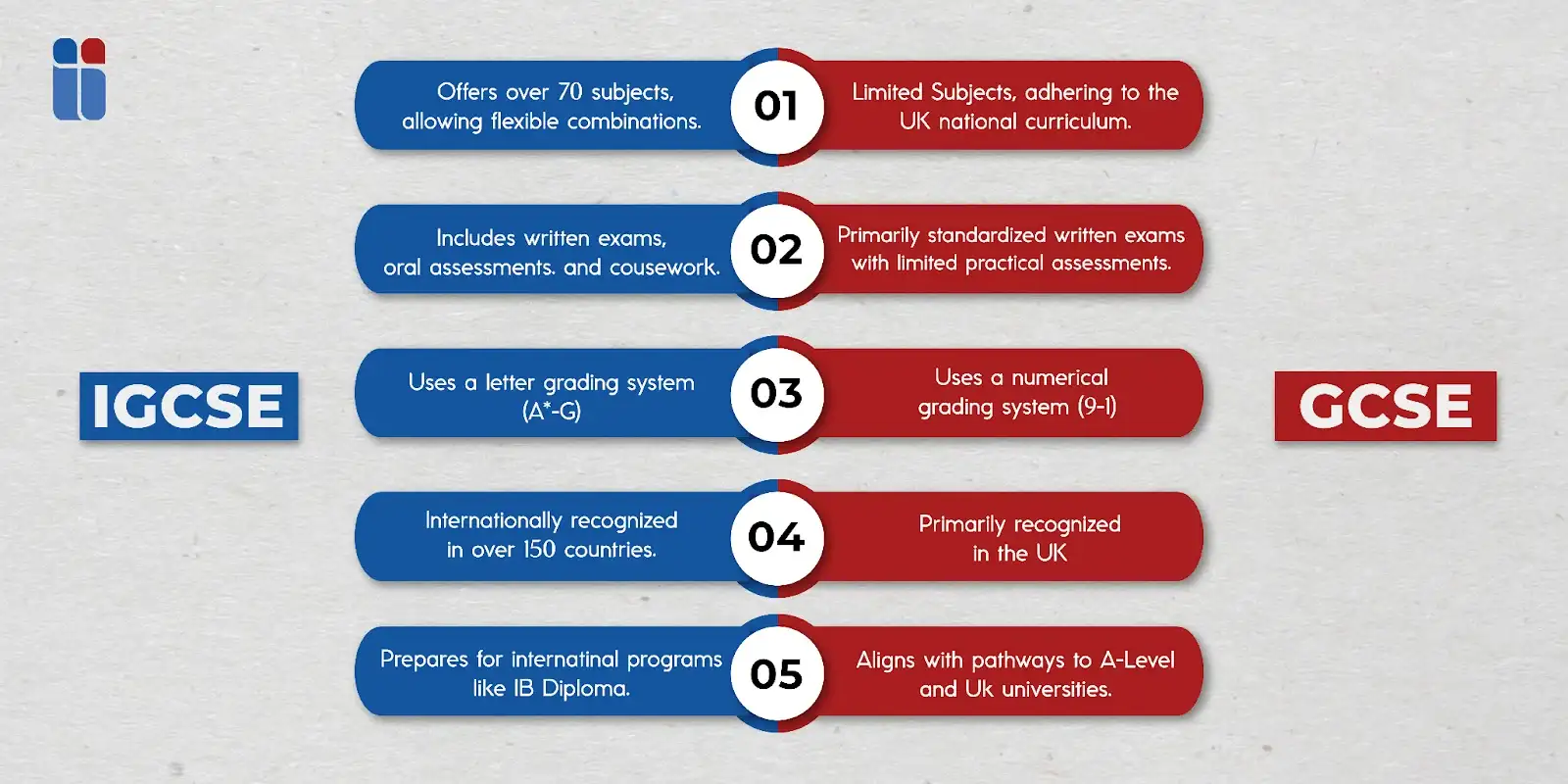There comes a point in life to choose the best educational path that paves the way for a successful career in the future.
Here’s an interesting fact, 70% of secondary school students already decide their careers and choosing the right diploma program makes it more convenient. Now, the question is, which choice is better, IGCSE or GCSE? So, let’s find out!
This blog explores the IGCSE vs GCSE debate, helping you make an informed choice while understanding how IB Innovators and their expert IB tutors can help students excel.
Contact IB Innovators to learn more about IGCSE vs. GCSE and excel in your academic journey!
What is IGCSE?
The IGCSE full form is the International General Certificate of Secondary Education. The whole qualification has been developed by Cambridge International and it is a qualification for schoolchildren aged 14 to 16 worldwide.
It differs from traditional curricula in that it provides flexible frameworks designed to suit all kinds of learning, and it is practical with a global significance as well.
The IGCSE certificate is highly valued worldwide. Many international schools and institutions recommend it as a preparatory course for advanced studies like the International Baccalaureate (IB) Diploma or A-Levels.
FYI! Subjects like IGCSE physics demonstrate the program’s focus on combining theoretical knowledge with hands-on experiments, making it appealing for students interested in STEM careers. |
What is GCSE in the UK?
The UK’s national curriculum incorporates the GCSE exams and a general secondary education certificate. Students of the same age will take this standardised test before university.
Subjects are predetermined, and the three cores (English, Mathematics, and Science) must be taken. The curriculum aligns closely with British academic standards, offering students a clear pathway to A-Levels and UK universities.
IGCSE vs GCSE: Major Differences
Before getting into the details, it is important to mention that both of these diploma programs are highly recognised in the UK and worldwide. The difference mainly comes in the curriculum, the grading system, and the institutions that work as the caretakers. So, let’s dive in!
1. Curriculum and Flexibility
IGCSE: Offers a wide selection of over 70 subjects, ranging from sciences to arts and humanities. Its flexibility allows students to choose combinations that suit their interests, enabling a more customized learning experience.
Real-world applications and global perspectives are often integrated into subjects like IGCSE physics and economics.
GCSE: A shorter list because it conforms to the national UK curriculum and has fewer subjects and options within it. The structured program allows all students to have the same subjects and thus gives them equal content, but it is not flexible.
2. Exam Style and Assessment
IGCSE: It focuses on diverse modes of assessment: such as, through written examination, oral assessment, and coursework. For example, IGCSE Physics, as part of practical, allows a student to be experimentally led to learn science.
Thus, a divergent method encourages critical thinking and analytical abilities and promotes understanding of the topic.
GCSE: The GCSE is based mainly on standardized written examinations to test the knowledge of the students. Although practical assessments and coursework are included, they are generally limited to areas such as Science and Art.
This approach is more fact-based recall and is based on testing theoretical knowledge rather than practical application.
Remember! Practical experiments, as done in IGCSE Physics, help us understand how theory could be applied to reality. |
3. Grading Systems
IGCSE: Classic grading A*-G. This is closely akin to most international institutions and thus makes it easy for several people to be internationally understood.
GCSE: The new numerical grading scale (9-1) is the method of measurement, with 9 as the highest grade. This new system is meant to distinguish between students who have higher abilities more clearly.
4. Global vs Local Recognition
IGCSE: It is so much recognized internationally that IGCSE has more than 150 countries where this highly valuable qualification is most recommended for admission of students wishing to study abroad or join international universities.
Its strong global standing and flexibility make it an excellent stepping stone toward an international education or career.
GCSE: The GCSE holds its primary locus in the UK and is thus recommended for students who are focusing primarily on UK-specific academic and professional avenues.
While recognition may be geographically limited, it is nonetheless a robust qualification for students intending to further their studies or careers within the UK context.

Advantages of IGCSE
Global Acceptance:
The IGCSE certificate is accepted worldwide by different universities and employers, so it is the best option for students who have dreams of going international.
Practical Learning Approach:
The IGCSE physics course teaches all its students to grab concepts through practical experimentation, skills that are highly applicable in the real world.
Broad Subject Choices:
The IGCSE will have many subjects to give to students, hence all options to opt to explore possible interests and strengths are not limited.
Preparation for Higher Studies:
The IGCSE is the best preparatory foundation for any international qualification program such as the International Baccalaureate Diploma or their advanced level equivalents.
FYI! The IGCSE is accepted across more than 140 countries and recognized by leading universities and therefore is favored among students who are keen to think globally. |
Advantages of GCSE
Aligned with UK Standards:
With the GCSE exams, students can easily transfer to A-Level study or vocational qualifications in the UK, the education achievement is equal perfectly with British academic standards.
Simplified Subject Structure:
The GCSE is straightforward in its delivery of subjects, as it emphasizes relevant subjects that build the base.
Local Relevance:
This is important for students who desire to continue studying or working in the UK as the GCSE is quite relevant and practical.
IGCSE or GCSE: Which One is Right for You?
Choosing between IGCSE or GCSE depends on your goals, learning preferences, and plans:
- If you’re aiming for international exposure or higher education abroad, the IGCSE is more suitable due to its global recognition and flexible learning framework.
- This aligns your focus on studying or working in the UK better with the local educational and professional requirements.
Remember! Choosing the right curriculum, like IGCSE or GCSE, can shape your future academic path. Both offer unique advantages, so aligning your choice with your goals is key to success! |
IB Innovators has developed a team of expert IB tutors providing one-on-one guidance for students to excel in either pathway. Our programs are always tailored to cover gaps in understanding and ensure preparation for advanced studies like the IB Diploma.

Summing Up
The decision between IGCSE and GCSE is crucial in shaping a student’s academic journey. Both qualifications offer unique advantages, tailored to different goals and aspirations. By understanding these differences, students can make well-informed choices that align with their plans.
With personalized programs and expert IB tutors, IB Innovators is here to help students succeed in their academic endeavors. Whether it’s excelling in IGCSE physics or preparing for advanced studies, our team provides the support needed to achieve your potential.
Do you like what you read? Learn more about IB tutoring on our blog here.
FAQs
What is GCSE equivalent to internationally?
The GCSE is equivalent to high school qualifications in many countries, including the American high school diploma and Canadian Grade 10.
Is IGCSE harder than GCSE?
Difficulty levels vary based on individual learning styles. The IGCSE’s emphasis on practical assessments may suit some students, while others might prefer the structured format of the GCSE exams.
Is IGCSE physics challenging?
IGCSE physics combines theoretical and practical components, making it both challenging and rewarding for students interested in science and technology.
How do IB Innovators support IGCSE students?
Through tailored IB tutoring programs, IB Innovators ensures students excel in their chosen subjects, including IGCSE physics. Our expert IB tutors offer personalized support for academic success.







